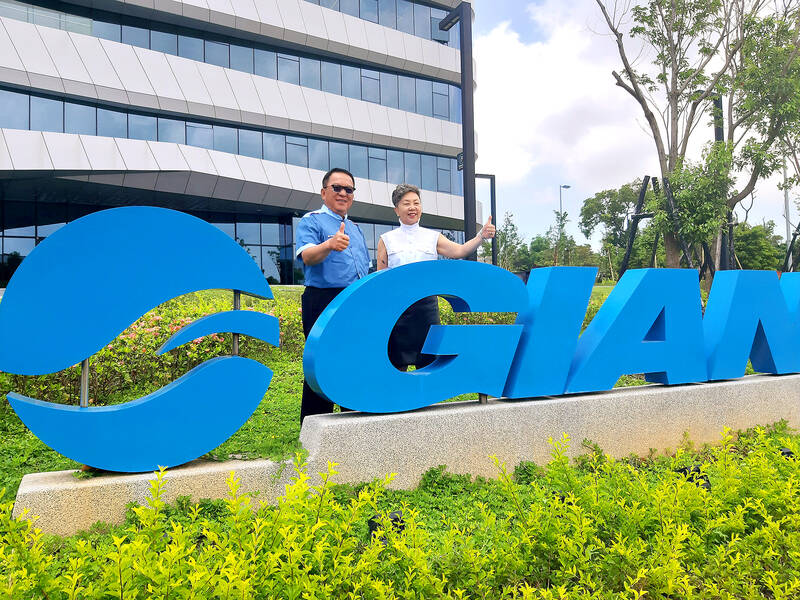Giant Manufacturing Co (巨大), one of the world’s leading bicycle manufacturers, yesterday expressed concern that global inventory adjustments would continue into the first quarter next year.
Speaking at the company’s annual general meeting, Giant chairwoman Bonnie Tu (杜?珍) said that although pressure from inventory adjustments hit its peak at the end of last year, the inventory digestion has been slower than expected.
Given weaker-than-expected demand, the impact could last into the first quarter of next year, she said.

Photo: CNA
The bicycle industry had expected inventory levels to return to normal in the third quarter or even the fourth quarter.
This year has been a challenging year for the bicycle industry, leading to inventory adjustments in the US and European markets, Tu said.
Nonetheless, Giant remains upbeat about the industry’s long-term prospects, Tu said, citing demand driven by e-mobility, environmental protection and sports.
Giant CEO Liu Yuon-chan (劉湧昌) said that demand for low-to-mid-end bicycle models in the US market has stayed weak.
However, the Chinese market is showing signs of a recovery, especially for mid-to-high-end models, he said.
Globally speaking, the demand for pedal-assist e-bikes, high-end road bikes and mountain bikes have improved, Liu said.
In December last year, Giant reportedly sent a letter to suppliers asking for a 45-day payment extension in the wake of weak global demand.
The reports said the letter, signed by Yen Ching-hsin (顏清鑫), head of Giant’s global manufacturing center, was sent to suppliers that had or would ship their products to Giant between December last year and March.
The reports triggered a sell-off of Giant shares.
In response, Giant said that nondisclosure agreements prevented it from discussing the details of the letter sent to its suppliers, but added that, as a leader in the global bicycle industry, the company was determined to work closely with its suppliers to deal with inventory adjustments and diversify market risks.
In the first five months of this year, Giant posted consolidated sales of NT$34.9 billion (US$1.13 billion), down 3.45 percent from a year earlier.
The bicycle brand said that revenue from China rose more than 70 percent from a year earlier, while sales in the US and European markets dropped during the same period.
Shareholders yesterday approved Giant’s proposal to distribute NT$7.80 in cash dividends after posting earnings per share of NT$15.51 for last year.

Intel Corp chief executive officer Lip-Bu Tan (陳立武) is expected to meet with Taiwanese suppliers next month in conjunction with the opening of the Computex Taipei trade show, supply chain sources said on Monday. The visit, the first for Tan to Taiwan since assuming his new post last month, would be aimed at enhancing Intel’s ties with suppliers in Taiwan as he attempts to help turn around the struggling US chipmaker, the sources said. Tan is to hold a banquet to celebrate Intel’s 40-year presence in Taiwan before Computex opens on May 20 and invite dozens of Taiwanese suppliers to exchange views

Application-specific integrated circuit designer Faraday Technology Corp (智原) yesterday said that although revenue this quarter would decline 30 percent from last quarter, it retained its full-year forecast of revenue growth of 100 percent. The company attributed the quarterly drop to a slowdown in customers’ production of chips using Faraday’s advanced packaging technology. The company is still confident about its revenue growth this year, given its strong “design-win” — or the projects it won to help customers design their chips, Faraday president Steve Wang (王國雍) told an online earnings conference. “The design-win this year is better than we expected. We believe we will win

Quanta Computer Inc (廣達) chairman Barry Lam (林百里) is expected to share his views about the artificial intelligence (AI) industry’s prospects during his speech at the company’s 37th anniversary ceremony, as AI servers have become a new growth engine for the equipment manufacturing service provider. Lam’s speech is much anticipated, as Quanta has risen as one of the world’s major AI server suppliers. The company reported a 30 percent year-on-year growth in consolidated revenue to NT$1.41 trillion (US$43.35 billion) last year, thanks to fast-growing demand for servers, especially those with AI capabilities. The company told investors in November last year that

Power supply and electronic components maker Delta Electronics Inc (台達電) yesterday said it plans to ship its new 1 megawatt charging systems for electric trucks and buses in the first half of next year at the earliest. The new charging piles, which deliver up to 1 megawatt of charging power, are designed for heavy-duty electric vehicles, and support a maximum current of 1,500 amperes and output of 1,250 volts, Delta said in a news release. “If everything goes smoothly, we could begin shipping those new charging systems as early as in the first half of next year,” a company official said. The new